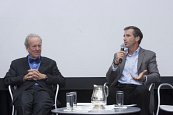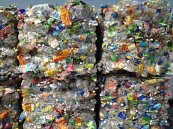Plastic Opportunities for Change
Published on 15 April 2017
Whether or not the ocean and our waters upstream are drivers for needed improvements in plastic pollution reduction, the health of our communities, and the customers we all need, should be incentive enough to demand and encourage management to really focus on being an active participant in the circular economy. Plastic pollution is now on the top of many environmental agendas, as it directly impacts the abilities of cities to be resilient, and “smart.” Governments can facilitate circularity and waste avoidance, but it is the private sector which will thrive on it once some good case studies are promoted, scaled and replicated.
Plasticity Looks at the Next Life of Plastics
Gayle Putrich
Published on 03 July 2014
More often than not, debates about end-of-life problems with plastic results in industry vs. environmentalist finger-pointing, stalemates — and no viable solutions.
But not at the Plasticity Forum. The one-day event examining the future of plastic, held June 24 at Tribeca Rooftop in New York, brought together would-be opponents for a day of collaboration and discussion on how to treat plastic as a resource and not waste.
Plastic Pollution Solutions
Published on 29 May 2014
For too long, topics about trash have been on the back burner. Litter is an eyesore, and when countries can “sweep it away,” they do. having traveled to many countries, it is apparent that not everyone has good waste management infrastructure, much less enough recycling capacity. The world has yet to scale some of the ground-breaking plastic innovations currently available, harnessing the resource value that plastic has. We believe the discussion at Plasticity can help change our ways of thinking of plastic, and waste. Plastic pollution is a global issue, but needs to be resolved at the local level.
Plastic - If You Can Measure It, You Can Manage It
Published on 29 May 2014
Plastic has many great uses, due to its light weight, flexibility in molding, and durability – yet these are also its downfalls, particularly because it is difficult to create economies of scale for the many varieties of plastic that exist. In the US alone, estimates are that over US$8bn per year is ‘left on the table’ in the form of packaging waste alone, which does not get recycled.
Roughly 85% of the plastic used in products and packaging is not recycled, and this is a large, global opportunity – an opportunity for cleaning our country sides and waterways, while creating jobs and innovation.
VinylPlus raises the bar by registering over 440,000 tonnes of recycled PVC in Europe in 2013
Summary by Billy Chan
Published on 26 May 2014
VinyPlus successfully met its PVC recycling target in Europe in 2013
Press Release - Plasticity NYC
Published on 06 May 2014
On the 24th of June, 2014, the 3rd annual Plasticity Forum will be hosted in New York City. Following on from the success of the previous forums in Rio 2012 and Hong Kong 2013, this year’s forum will concentrate on “Innovation and Collaboration in a Material World”. A showcase of ideas in motion, Plasticity will include the latest developments in waste as a resource, scalable innovations in plastic that save money, use of new materials, designing for sustainability and solutions for a world where plastic is used, but without the footprint.






